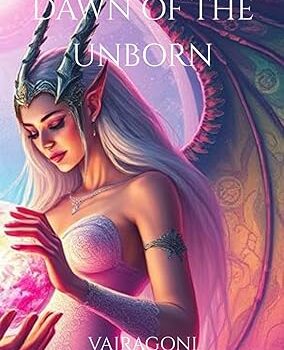 Education
Education
Dawn of the Unborn: A Journey Through Mythic Fantasy, Consciousness, and Rebirth
In the vast realm of literature, mythic fantasy novels have always held a special place in our hearts. From ancient kingdoms to epic journeys, these stories explore the limits of human imagination, bringing us face to face with mythical creatures, forgotten realms, and ancient prophecies. In the United States, readers continue to be drawn to books that combine elements of adventure, philosophy, and self-discovery. Among the many mythic fantasy novels that are sweeping the nation, Dawn of the Unborn stands out as a powerful, thought-provoking tale that delves deep into the realms of life, death, and rebirth. But what is it about books like these that resonate so deeply with readers? Let’s dive in.
Mythic Fantasy Novels with Ancient Settings and Epic Journeys
The allure of mythic fantasy novels often lies in their ancient settings. These tales transport readers to times long past, where the boundaries between reality and myth blur. These worlds are not simply places to escape; they are also where the greatest journeys unfold. The idea of embarking on an epic quest to uncover long-lost truths or defeat a world-threatening evil has always captured the imagination of fans. Dawn of the Unborn is no different. Its narrative is woven through an ancient civilization that has long since been forgotten, but whose wisdom is still felt in the very air and earth of the land.
In many mythic fantasy novels, such as The Lord of the Rings and The Wheel of Time, the protagonists embark on a journey that forces them to grow, learn, and confront their deepest fears. In Dawn of the Unborn, the characters’ journey is not just physical—it is deeply philosophical and metaphysical. They navigate realms beyond the physical world, questioning the nature of life, death, and the identity of the self. It’s a journey that challenges everything they know about existence.
Best Philosophical Science Fiction Books Like Dune or Foundation
Much like classic science fiction novels such as Dune by Frank Herbert and Isaac Asimov’s Foundation, Dawn of the Unborn explores big ideas about consciousness, identity, and the very nature of reality. These works have stood the test of time, not only because of their imaginative worlds but also because of their deep philosophical underpinnings.
Dune, for instance, delves into the nature of power, religion, and human potential, while Foundation examines the rise and fall of civilizations and the impact of knowledge on humanity’s destiny. Similarly, Dawn of the Unborn invites readers to think about the cycles of life and death and the ways in which they shape who we are. Its characters must grapple with existential questions, including their connection to a higher power and their role in the grand tapestry of the universe.
The philosophical nature of Dawn of the Unborn makes it a perfect companion for readers who enjoy works like Dune and Foundation. However, Dawn of the Unborn adds a layer of mysticism and myth that sets it apart. It blends the best elements of both fantasy and science fiction, exploring consciousness and identity in a way that few books dare to do.
Science Fiction and Fantasy Series Exploring Consciousness and Identity
Another reason why Dawn of the Unborn resonates so strongly with readers is its exploration of consciousness and identity. Many mythic fantasy novels and science fiction series, such as The Matrix or The Chronicles of Narnia, delve into the nature of reality and the ways in which identity can shift and evolve.
In Dawn of the Unborn, consciousness is a key theme. The protagonists encounter strange phenomena that force them to question the very nature of their existence. Are they truly who they think they are? Or is there more to them—something deeper and more ancient—that has been hidden away, waiting to be uncovered?
This exploration of consciousness and identity is particularly appealing in a world where many people are searching for meaning and self-understanding. In a way, Dawn of the Unborn offers a mirror for readers, reflecting their own journey of self-discovery and transformation.
Fantasy-Based Novel with Emotional Depth
What truly sets Dawn of the Unborn apart from other mythic fantasy novels is its emotional depth. While many fantasy novels focus on action, adventure, and world-building, Dawn of the Unborn offers a more intimate look at its characters’ inner worlds. The protagonists are not just fighting to save their world or complete a quest—they are also battling their own fears, insecurities, and desires.
The emotional depth of the story adds layers of complexity to the narrative, making it more than just a simple fantasy adventure. It’s a tale of growth, healing, and the journey toward understanding oneself. As the characters travel through mystical lands and encounter otherworldly beings, they also grapple with their inner demons, making their journey a true test of character.
This emotional resonance is something that fantasy readers are often drawn to. The best fantasy novels are not just about escapism—they are about connecting with the emotions and experiences that make us human. Dawn of the Unborn does this in a way that feels both ancient and timeless, offering readers a chance to reflect on their own emotional journeys.
New Mythic-Fantasy Books About Life, Death, and Rebirth Journeys
At its core, Dawn of the Unborn is a story about life, death, and rebirth. These are themes that have appeared in mythic storytelling for centuries. From the Greek myths to the epic tales of the Arthurian legends, the cycle of life and death is a central theme in many ancient stories.
In Dawn of the Unborn, these themes are explored in unique ways. The characters are not just confronted with death in the physical sense—they must also face the death of their old selves and the rebirth of something new. This process of transformation is integral to the plot, and it’s something that resonates with readers who are interested in personal growth and spiritual journeys.
The exploration of death and rebirth is particularly relevant in today’s world, where many people are searching for meaning and answers to life’s big questions. Dawn of the Unborn offers a narrative that invites readers to reflect on their own experiences of growth, change, and renewal.
First Book in a Thought-Provoking Mythic Fantasy Series
As the first book in a mythic fantasy series, Dawn of the Unborn sets the stage for an even larger narrative. It introduces readers to a world rich in lore and history, laying the foundation for the epic journey that will unfold over the course of the series. But it also leaves readers with questions and mysteries that will keep them coming back for more.
For fans of series like The Stormlight Archive or A Song of Ice and Fire, Dawn of the Unborn offers the promise of more to come. It is a story that is just beginning, and readers will want to follow these characters as they continue their journey through this richly imagined world.
Conclusion
In a landscape filled with fantasy and science fiction novels, Dawn of the Unborn stands as a powerful and thought-provoking entry into the world of mythic fantasy. Its exploration of ancient settings, epic journeys, consciousness, and emotional depth makes it a must-read for anyone interested in the philosophical side of fantasy literature. As the first book in a series, it promises to take readers on a transformative journey through life, death, and rebirth. If you’re looking for a novel that challenges your perceptions and takes you on an unforgettable adventure, Dawn of the Unborn is the book you’ve been waiting for.









